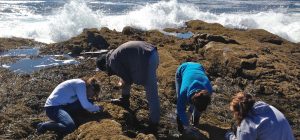Students’ Perspective on Understanding Environmental Change
 Our earth system is by no means a static and unchanging. Throughout time and space changes are always and have always been taking place– by natural means and, ever increasingly, by anthropogenic forces. The news is full of stories about our climate is changing and that people are the cause. Despite all of this media coverage, many do not believe that the environment is changing at all. So it is becoming increasingly necessary for scientists to have the skills to provide — and communicate — evidence of human-induced impacts. For example, SBS helps students investigate relevant research that counters common misconceptions such as: “earth had a pristine ‘original condition’ that humans have been destroying over time” or “humans are incapable of affecting the earth’s environment on very large scales.”
Our earth system is by no means a static and unchanging. Throughout time and space changes are always and have always been taking place– by natural means and, ever increasingly, by anthropogenic forces. The news is full of stories about our climate is changing and that people are the cause. Despite all of this media coverage, many do not believe that the environment is changing at all. So it is becoming increasingly necessary for scientists to have the skills to provide — and communicate — evidence of human-induced impacts. For example, SBS helps students investigate relevant research that counters common misconceptions such as: “earth had a pristine ‘original condition’ that humans have been destroying over time” or “humans are incapable of affecting the earth’s environment on very large scales.”
Environmental Investigation “Tool Kit”
The first step in being able to analyze changes in an environment’s “original condition” is access and exposure to the appropriate techniques. The SBS “Human Impacts on the Ocean” (HIOTO) course is geared toward just that: giving students the tools necessary to conduct environmental change research. Each week a different topic is discussed involving human activities and their potential impacts on the ocean including: the effects of river diversion and damming on sea level change, eutrophication due to nutrient input into rivers and oceans, iron fertilization, and the burning of fossil fuels. These discussions are augmented by field trips to many coastal Maine locations. The SBS environmental investigation “tool kit” allows students to: 1) Identify perturbations; 2) Assign causations; 3) Discuss future implications; and, 4) Propose possibilities for remediation. In addition, external professionals are regularly brought in to discuss concepts that demand expertise beyond the HIOTO classroom.
Understanding Environmental Change
As long as humans have been on earth, they have had environmental impact. Ancient populations overfished local marine species and depleted key resources. It is easy to view all human-related impacts as negative, especially as our population grows. As humankind continues to alter the geophysical earth — including ecological gradients — the distributions and abundances of marine and terrestrial organism will be affected. In this world of undeniable change, there is a great need for scientists to work with industry and the government to limit the human ecological footprint through advances in technology and policy. The “take home message” for one SBS student: “Yes, the world is always changing, but it is necessary to recognize these changes and to minimize our negative role in them.”
